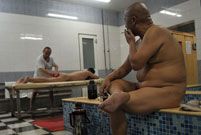 Opps! What a coincidence!
Opps! What a coincidence!
 Breathtaking scenery in Redstone Park in SW China
Breathtaking scenery in Redstone Park in SW China
 Vintage cars show kicks off in London
Vintage cars show kicks off in London
 Gorgeous scenery in NE China
Gorgeous scenery in NE China
 Picturesque Barkol grassland in Xinjiang
Picturesque Barkol grassland in Xinjiang
 Small Wild Goose Pagoda - A World Cultural Heritage Site along the Silk Road
Small Wild Goose Pagoda - A World Cultural Heritage Site along the Silk Road
 Maritime Silk Road Luxuries of the Han Dynasty
Maritime Silk Road Luxuries of the Han Dynasty
 Ciao! Chinese beauties!
Ciao! Chinese beauties!
 An eye feast: BFA freshmen registration
An eye feast: BFA freshmen registration
 Top 10 most lavish weddings
Top 10 most lavish weddings
The nation's first "designer" test-tube baby, who will help his seriously ill sister with stem cell transplants, was born in July in Guangzhou, Guangdong province. GUO CHEN/XINHUA
But in large cities such as Beijing, Shanghai and Guangzhou, the infertility rate is even higher at 15 percent, which means one in 10 couples of childbearing age have difficulty conceiving.
Peking University Third Hospital, one of China's leading hospitals for the treatment of infertility problems, receives 1,500 couples hoping for a baby every day.
"Many factors can be blamed for an increase in the infertility rate, including stress, abortion, pregnancy at an older age and environmental pollution," said Qiao Jie, president of the hospital.
The transfer of sperm, eggs and embryos between hospitals is forbidden in China. In 2001, the Health Ministry issued a regulation on assisted fertility techniques that banned both commercial and altruistic surrogacy.
For wealthy Chinese who want to have a child through surrogacy, destinations such as some states in the US and India, where the service is legally protected, have become safe options.
"Most of the clients we have seen from China are from wealthy backgrounds and have a lot of power within their industries. These clients know what they want and how to get it," said Barrie Drewitt-Barlow, head of social work at the British Surrogacy Centre of America, a US-based surrogacy center with offices in California, New Jersey and the UK.
The center has handled about 800 live births since it was established in 2000. Seventy percent of them were in the US and the rest in the UK. The clients' ages range from 35 to 65.
"China has always been a country of great opportunity within the surrogacy world. The number of clients from China has grown steadily and it continues to climb today. Many of our clients wish to try for multiple births and have twins, mainly because of the rules in China on birth control and the numbers of children per family," Drewitt-Barlow said.
In the past five years, the organization has worked with more than 100 couples from China both from the straight and gay communities, Drewitt-Barlow said. He said China will continue to be a growth area and the group plans to have a branch office in the country within the next five years.
Paying for a woman to carry a child is legal in 19 US states, which have laws that recognize compensated surrogacy. Another 10 allow unpaid surrogacy. Under the existing laws, the names of the intended parents will be directly written on the baby's birth certificate and they will be legally recognized as the baby's parents.
Under the rules of the US Food and Drug Administration, donors of eggs, sperm, and embryos have to be tested as a precaution to protect the recipient–the gestational carrier in this case–against contracting any diseases from the embryo.
For surrogate mothers, the same test at the FDA-approved labs and a physiological test are also mandatory, according to a China Business News report. The blood of the spouses of married surrogate mothers is also tested.
But there are still risks involved for the Chinese intended parents.
A surrogacy agency should be registered with the FDA, but "they are not supervised by the FDA or anyone else, and this is why there are so many scams in the surrogacy marketplace", Liu from California Surrogacy Center said.
 |  |
 Vibrant 21-year-old and her own Cheongsam brand
Vibrant 21-year-old and her own Cheongsam brand Fashion style: Faye Wong vs Cecilia Cheung
Fashion style: Faye Wong vs Cecilia Cheung Jungle law: leopard preys on impala
Jungle law: leopard preys on impala Female bus driver drives Land Rover for commuting
Female bus driver drives Land Rover for commuting Century-old public bath closes door in Beijing
Century-old public bath closes door in Beijing Leading director Wang Quan'an detained for 'buying sex'
Leading director Wang Quan'an detained for 'buying sex' Mixed reaction to smartphone sidewalk
Mixed reaction to smartphone sidewalk Amazing aerial photos of China's Xisha Islands
Amazing aerial photos of China's Xisha Islands Top 10 world's highest-paid models 2014
Top 10 world's highest-paid models 2014 Lingerie show at 2014 Miss China
Lingerie show at 2014 Miss China Songstress Li Xianglan dies at 94
Songstress Li Xianglan dies at 94 Police recruiting posters
Police recruiting posters Anshun Daxi- Living fossil of Chinese drama
Anshun Daxi- Living fossil of Chinese drama Urban farmers in China
Urban farmers in China 'Firepower-2014 Weibei'military exercise
'Firepower-2014 Weibei'military exerciseDay|Week|Month